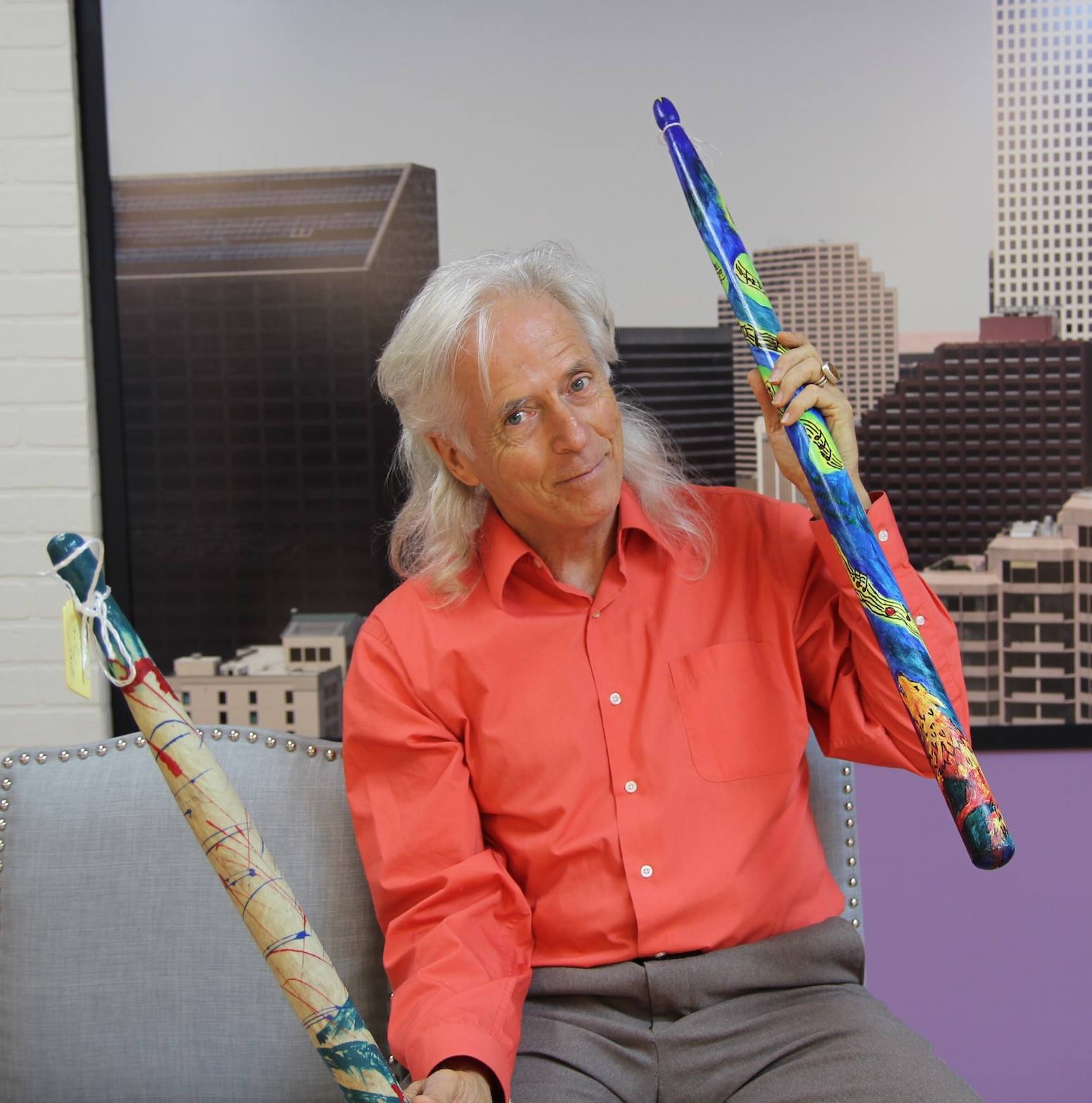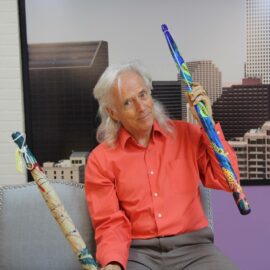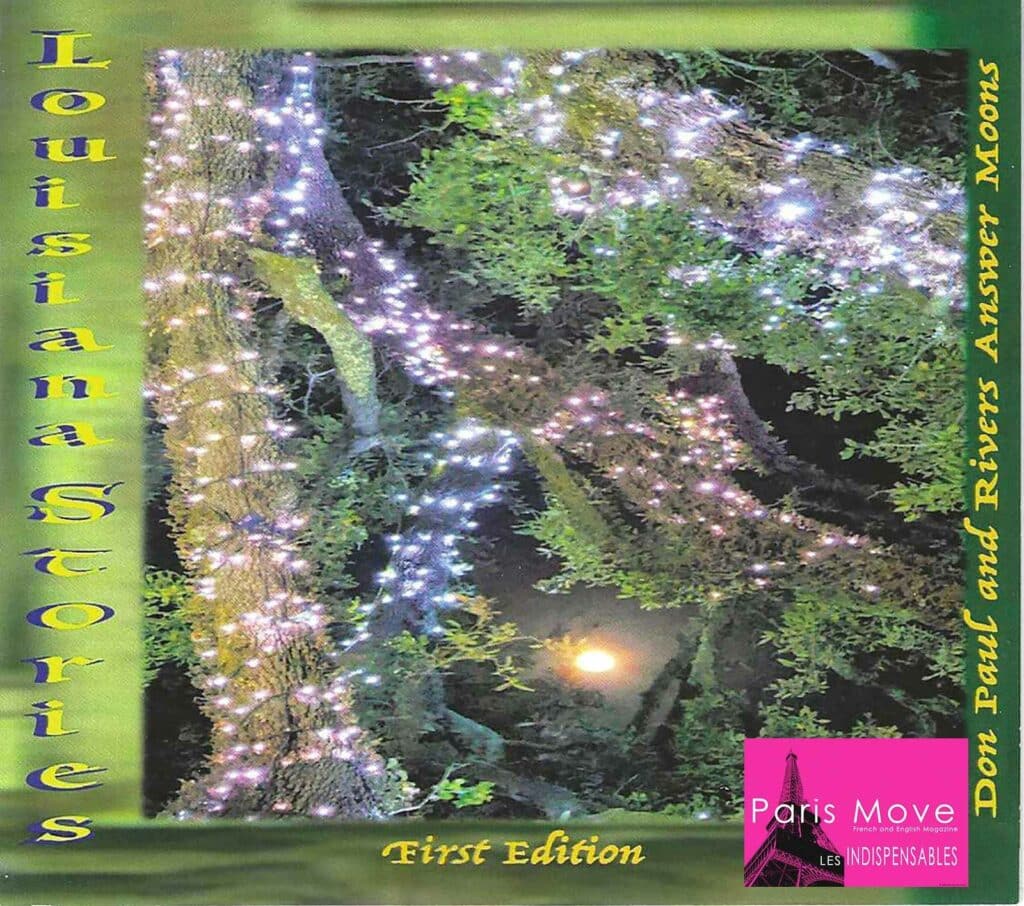
Seven Questions (or so) with Don Paul.
I had the pleasure of quizzing New Orleans poet Don Paul about his new album, Louisiana Stories, an off-the-chain original mix of jazz and spoken word with the supergroup Rivers Answers Moons. This interview endeavors to dive headfirst into the inspirations behind their astounding groove, the creative process, and other mysteries of the universe.
Ilene: First off, Mr Paul, thank you for agreeing to this interview! How did you meet this stellar group of musicians? And where does the name Rivers Answer Moons come from? It’s very evocative.
Don: Musicians, you know, Ilene, are born-and-bred in this place, New Orleans. I first met Kirk Joseph at a People’s Festival organized by my long-time friend Sakura Kone during JazzFest 2009, when Kirk’s Backyard Groove band was playing for that FREE Festival in the Lower 9th Ward. The People’s Festival coincident with JazzFest emanated from Sakura and I both working with Common Ground in 2006.
Roger Lewis I met when heading up a Team WWOZ running-team for the Crescent City Classic 10-kilometer event in 2014. I asked Roger and the Dirty Dozen Brass Band to put $200 toward sponsoring the Team and of course he and the DDBB.
By the next year, the three of us were making music with trumpet-player Mario Abney—they were part of my two hours at the Louisiana Music Factory in November 2016 along with Kidd Jordan and Carl LeBlanc and I in duets and trio.
Don Vappie I first got to know as a player through my friendship with Evan Christopher. I thought from the first what I felt from Roger and Kirk—Don was/is a very expressive, accomplished musician and a fine person. Herman LeBeaux I knew through his work with Allen Toussaint. One instance that particularly impressed me about Herman was his questioning drummer Alvin Fiedler about some techniques on the drums-set after a Jazz Camp Faculty Concert that Kidd led. Herman was/is so sincere!
Alexey Marti again is a musician of very, very high skills and creativity—and he’d been a Volunteer Player at Sticking Up For Children’s Music & Arts Days for parents and children in New Orleans since 2013. Alexey played with Roger and Kirk and Mario in several of SUFC’s end-of-year Concerts and Dinners…. So every one of the musicians already knew and appreciated each other before Rivers Answer Moons. Kirk and Herman played in Middle-School Band together. Roger and Kirk have 47 or so years with tie Dirty Dozen. Don and Herman know each other from New Orleans Ballet Association performances. They all were and are meant to gel —and I couldn’t be happier with how we’re getting along in creations and altogether.
The name Rivers Answer Moons comes from a poem that came to me one morning of early March 2006 in Caracas, Venezuela. I was there with a Common Ground delegation to petition the Chavez-led government for funding of agriculture in the Lower 9th Ward.
The poem just sprang up over morning coffee: “Because the River/ Answers to the Moon/ And gather silt/ From ALL its Streams/ Sky and River/ Never choose/ Who touches them/ And whom they touch.” You could say that the poem—and the name and the band—are about God and Gods obviously intending all Creation for all human beings and everything.
Ilene: As in… the creative spirit?
Don: Yes, God and Gods as the Agency or Spirit of Creation.
Ilene: Jack Groves is a real ear worm. That Don Vappie riff might be forever lodged in my head. That’s a picture of you in the liner notes on an offshore rig with a couple of friends in May 1978, right? You made me think of a discussion I saw the other day on social media about whether artists should have “regular” jobs or not, to keep them stable. Some would say that a steady job might also inform one’s existence. So economics aside, do you have any thoughts about the value that such jobs might have for an artist, even though they may appear light years away from creating art?
Don: The more variety of work that we get to do, the better, I think. Between 1973 and 1977 I was a logger in the Pacific Northwest of Washington State and in Southeast Alaska. Then, 1977 to 1980, I was a roughneck in the Gulf of Mexico (still Mexico). Logging with the Van De Grift gypo outfit in Skagit County was work that came to me by sheer chance—a flat tire that led to a Tavern and then the Van de Grift office.
Roughnecking came from my seeking to better know the U.S. South through working in it—and hence becoming a more complete writer about the United States. Jack Groves was indeed “my first driller” in the oil-field, February 1977. He revealed a great, great deal about his generation’s experience and his “Coon-Ass” environs. He and logging’s Jack Presley and Buster Worley were characters along with many, many others—I think of Mike Barnett, Norvel Rogers, Russel Hensler, Tim Ingrham, and Natives of Alaska, Washington and British Columbia—who reinforced to me how remarkable and sensitive working-class folks are. What’s that Isaac Babel title? ‘You Must Know Everything.’ I’d say—get to know as much as you can—especially in your 20s.
Ilene: “Something you got” has an unhinged, improvised quality to it. At first listen, I imagined a Beat poet getting up to improvise with hep cats in a smoky Greenwich Village basement bar. I could smell the bar. How did this vibe come about?
Don: Excellence of the musicians and the sympathy between us, I’d say. Both “Something You Got” and “My Mother’s Spirit Speaks To Me,” tracks 5 and 6 on the disc with vocals of Louisiana Stories were recorded in less than a half-hour in the Dockside Studio with Justin Tocket as our Engineer, mid-day of Wednesday, July 31, just before Louis and Andre Michot arrived. “Something You Got” was instrumental among Alexey, Don, Kirk and Roger with me doing scratch guide-vocals. One take, that one—like every one, come to think of it, in that warm nest called Dockside. The finished track vocals came in another half-hour on October 8 at Dockside as Justin and I were editing and mixing tracks. “My Mother’s Spirit […] “ was/is Don, Kirk and Roger and I going by feel in a Funeral March pattern-and-improvisation that they’ve known “since they ‘ze babies.”
Ilene: I’m fascinated by the images of Big Chief Shaka Zulu’s suit in the liner notes. What inspired you to include these specific details? Are you creating a 3D mental picture to go with the words and the music?
Don: All honor and admiration to Big Chief Shaka is the primary impetus there—to him and all the Artist Suit-Creators in New Orleans and elsewhere. The close-ups of parts of his suit intend to show how superb and difficult is the workmanship that goes into rendering the GENIUS of each suit. To me, Shaka and his peer’s suits resemble the metal art of Haitian artists such as Serge Jolimeau and Rony Jacques and Jacques Eugene and … again, many, many more.
Ilene: One more liner note request for information: What is the Funny Walk Contest? Does NOLA have a Ministry of Funny Walks?
Don: So glad you asked! When we perform Louisiana Stories in theaters, intermission will feature a Funny Walk display, or exhibition, say, in which audience and EVERYONE are encouraged to show his or her funny stuff. Kind of like Soul Train but … Our model, you might remember, refers to Monty Python and the Classes in Walking that—as I sketchily recall—John Cleese demonstrated, turning at right-angles into Hedges and Mail-Boxes, for the decided need of early-morning pedestrians in London. You might remember how it is to walk in early-morning London. I think the adjective “Dodgy” might have arisen there and then.
Ilene: This makes me think of sidewalks in France, in some towns and neighborhoods where people forget to clean up after their dogs (or possibly, themselves). One develops almost a radar for avoiding the caca and stops looking down after a while… You just know it’s there. Any pearls of wisdom for artists bummed out about how much the world of the arts has changed since the pandemic?
Don: Trying to NOT be sententious—but, really and truly, as Jack Groves used say, every experience can be INSPIRATION. And nothing is perfect – only becoming perfect.
Ilene: Sales of Louisiana Stories supports the organization Sticking Up for Children. Tell me, what do readers of Paris-Move need to know about Sticking up for Children?
Don: Sticking Up For Children is an organization born to Maryse Philippe Dejean (my wife) and me by Cyril and Gaynielle (your friend, too) Neville in February, 2013. Cyril donated revenue from his song “Ayiti” to a the Foyer Espoir Pour les Enfants (FEPE) orphanage and its founder, Marie Jo Poux, through connections facilitated by Maryse after the January 12, 2010 Earthquake in Haiti. SUFC now works with FEPE and three Schools in Haiti and several Partners in Louisiana. You can check them out here. Our focus since 2020 is an effort for Universal Literacy in Haiti through video-lessons that draw from a textbook, Mon Livre Unique, authored by Maryse’s Aunt, the splendid educator Marie Marthe Balin Franck Paul, Principal of College Canapé Vert in Port-au-Prince.
Ilene: Bonus question! Gulf of Mexico, Gulf of America, or “the Gulf?” (Is there a fourth option?)
Don: I favor ‘Gulf of the Indigena’.
.
Interview Don Paul by Ilene Martinez
PARIS-MOVE, February 6th 2025
Follow PARIS-MOVE on X
:::::::::::::::::::
You can buy the Don Paul and Rivers Answer Moons album Louisiana Stories here.
And if you want to know more, lucky you – Thierry De Clemensat’s original review of Louisiana Stories is right here in Paris-Move!

